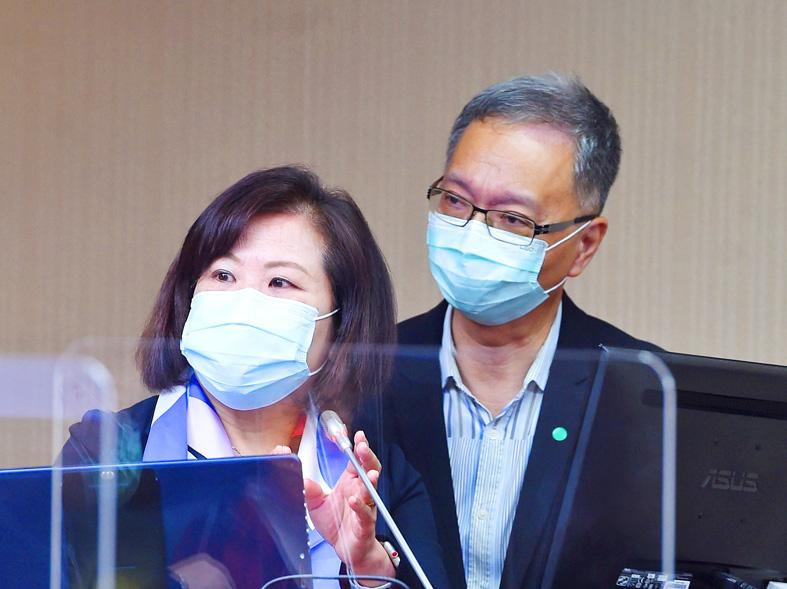An entry ban on migrant workers is to be temporarily lifted this month, but reimposed for two months from Dec. 14, the Ministry of Labor said.
The reintroduction of the ban is intended to free quarantine hotel space to accommodate large numbers of overseas Taiwanese who are expected to begin returning for next year’s Lunar New Year holidays later in December.
“At the latest, migrant workers will be granted entry to Taiwan in mid or late November,” Minister of Labor Hsu Ming-chun (許銘春) said at a legislative hearing.

Photo: Liu Ming-de, Taipei Times
However, as Taiwan is likely to see an influx of nationals returning home for the Lunar New Year, the entry of migrant workers is to be suspended again from Dec. 14 to Feb. 14, she said.
Taiwan first banned entry of migrant workers from Indonesia in December last year due to the COVID-19 situation in that country.
On May 19, Taiwan banned entry of all foreign nationals without residency, including migrant workers, following an unprecedented spike in domestic COVID-19 cases in Taiwan.
Hsu said that the Central Epidemic Command Center (CECC) on Tuesday approved the plan to allow entry of migrant workers, but the ministry first needs to communicate with the workers’ home countries to ensure cooperation with Taiwan’s disease prevention measures.
Details that need to be discussed include verifying which medical institutions issue valid COVID-19 test results, and reducing the number of workers who receive pre-departure training together at training centers, Hsu said.
The labor ministry plans to meet with Indonesian authorities next week to discuss that country being the first from which migrant workers can enter Taiwan under the plan, Workforce Development Agency Director-General Tsai Meng-liang (蔡孟良) said.
Meanwhile, Taiwan reported two new COVID-19 cases yesterday — one local and one imported — and no deaths from the disease.
The local case is a Taipei resident in his 30s, the CECC said.
His COVID-19 tests showed a relatively high cycle threshold value of 34, which indicates a low viral load and the possibility that he has been infected for a while.
Centers for Disease Control Deputy Director-General Philip Lo (羅一鈞) said that the man likely contracted the virus during a domestic outbreak of COVID-19 that began in May.
He had received one dose of an AstraZeneca vaccine in August, Lo added.
In other developments, Taiwan yesterday took delivery of 142,000 doses of the AstraZeneca COVID-19 vaccine purchased from the vaccine maker, the 12th delivery of a 10 million dose order that was signed on Oct. 30, last year.
To date, 6.53 million doses of that order have been delivered, the CECC said.
As of Thursday, Taiwan had obtained approximately 12.56 million AstraZeneca vaccine doses from the manufacturer, the global vaccine sharing initiative COVAX and donations from other nations, CECC data showed.
Premier Su Tseng-chang (蘇貞昌) yesterday said that 74 percent of Taiwan’s population has received one dose of a vaccine, while 35 percent are fully vaccinated with two doses, expressing the hopes that the two-dose coverage will reach 60 percent by mid-December.
Additional reporting by Lee Hsin-fang

A group of Taiwanese-American and Tibetan-American students at Harvard University on Saturday disrupted Chinese Ambassador to the US Xie Feng’s (謝鋒) speech at the school, accusing him of being responsible for numerous human rights violations. Four students — two Taiwanese Americans and two from Tibet — held up banners inside a conference hall where Xie was delivering a speech at the opening ceremony of the Harvard Kennedy School China Conference 2024. In a video clip provided by the Coalition of Students Resisting the CCP (Chinese Communist Party), Taiwanese-American Cosette Wu (吳亭樺) and Tibetan-American Tsering Yangchen are seen holding banners that together read:

UNAWARE: Many people sit for long hours every day and eat unhealthy foods, putting them at greater risk of developing one of the ‘three highs,’ an expert said More than 30 percent of adults aged 40 or older who underwent a government-funded health exam were unaware they had at least one of the “three highs” — high blood pressure, high blood lipids or high blood sugar, the Health Promotion Administration (HPA) said yesterday. Among adults aged 40 or older who said they did not have any of the “three highs” before taking the health exam, more than 30 percent were found to have at least one of them, Adult Preventive Health Examination Service data from 2022 showed. People with long-term medical conditions such as hypertension or diabetes usually do not

POLICE INVESTIGATING: A man said he quit his job as a nurse at Taipei Tzu Chi Hospital as he had been ‘disgusted’ by the behavior of his colleagues A man yesterday morning wrote online that he had witnessed nurses taking photographs and touching anesthetized patients inappropriately in Taipei Tzu Chi Hospital’s operating theaters. The man surnamed Huang (黃) wrote on the Professional Technology Temple bulletin board that during his six-month stint as a nurse at the hospital, he had seen nurses taking pictures of patients, including of their private parts, after they were anesthetized. Some nurses had also touched patients inappropriately and children were among those photographed, he said. Huang said this “disgusted” him “so much” that “he felt the need to reveal these unethical acts in the operating theater

Heat advisories were in effect for nine administrative regions yesterday afternoon as warm southwesterly winds pushed temperatures above 38°C in parts of southern Taiwan, the Central Weather Administration (CWA) said. As of 3:30pm yesterday, Tainan’s Yujing District (玉井) had recorded the day’s highest temperature of 39.7°C, though the measurement will not be included in Taiwan’s official heat records since Yujing is an automatic rather than manually operated weather station, the CWA said. Highs recorded in other areas were 38.7°C in Kaohsiung’s Neimen District (內門), 38.2°C in Chiayi City and 38.1°C in Pingtung’s Sandimen Township (三地門), CWA data showed. The spell of scorching